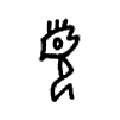Jul 02, 2021, 20:17
Here is the special Chinese character which has interested me for a few days. Now I would like share it with reader friends.
页(ye, the fourth tone) normally means ‘page’ in the modern society. But in ancient times, it was written as  (The picture above comes from the Internet.)
(The picture above comes from the Internet.)
The top is a big head with bright eye and hair as you see. The man is kneeling with the curved legs.
In fact the ancient word 页 meant ‘head' instead of 'page’. It seems unacceptable that the huge head has been simplified as a horizon stroke!
In other words, one stroke symbols the powerful brain in the following character:
领(ling, the third tone): the first part is 令(ling,the fourth tone) which means ‘order'; the 页 is a man with a wise head. So 领 means ’lead'.
顺 (shun, the forth tone, 'smooth') has the first part 川 which looks like the shape of a river. Yes, 川(chuan, the first tone) refers to 'river‘.
Does the picture of 顺 show the following: A man is boating down the river who feels that every thing goes like the water current?
In Chinese ’顺‘ means all things go without any obstacle.
This reminds me its opposite side:烦(fan, the second tone) is often used to describe Tom is in upset mood who is trouble. The reason is simple since the fire(火, huo,the third tone) is going to burn the man(页)!
In general 页 shapes like a human body which emphasizes the big head. Is it interesting?
For another example: 须(xu, the first tone). If you take 页 as a ‘head’, what are these fine threads before the face? Yes, they are your moustache and beard! Now you see, my native language is more vivid than English!You may think that the drawing of 须 looks like a portrait for an old man who enjoys his long hair growing around the mouth!
As for the common phrase 必须, it means ‘must’. Why? 必(bi, the forth tone) is composed by 心(xin,the first tone,heart) and one tilt stroke. What is that thing you put into your heart? We Chinese often say ‘放在心上”(put something in your heart) and ‘挂在嘴上’. The latter literally means ‘to hang something on the mouth’,in fact it is what you often talk about or mention like the moustache is always in front of the mouth! So 必须 represents ‘must’ which concerns both the heart and the mouth. Teaching is a must for SEARU.
Community login







Add a comment